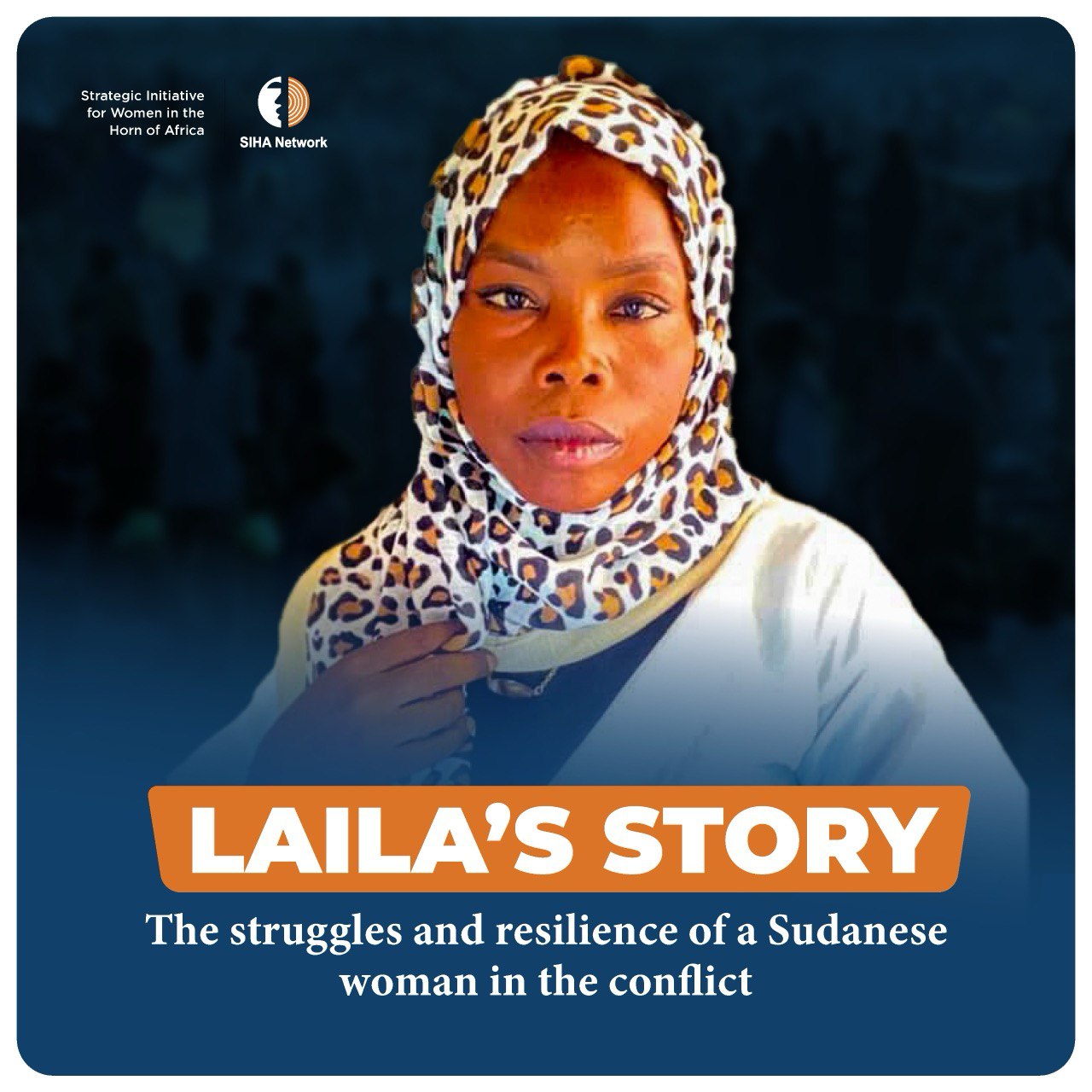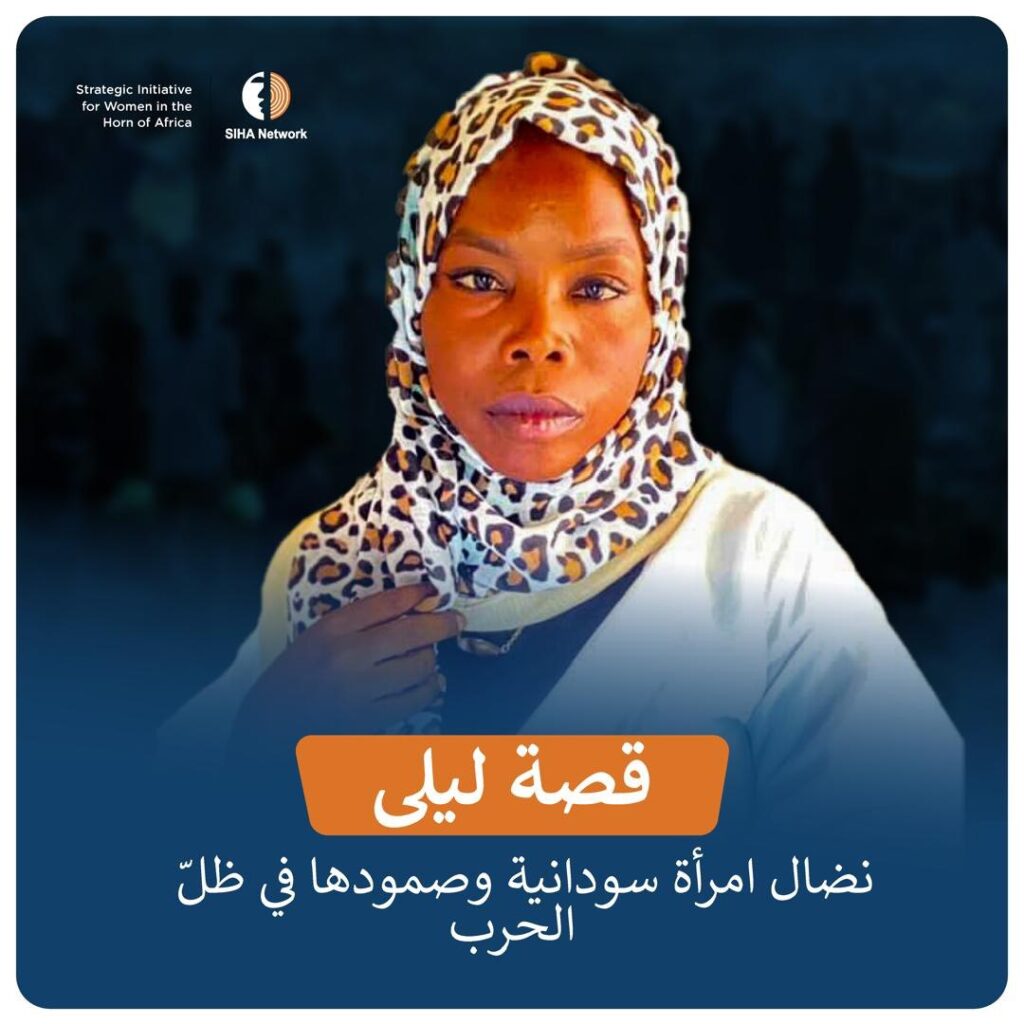
The struggles and resilience of a Sudanese woman, in the conflict: Laila’s story
“After the war broke out, I was in a difficult psychological state due to fear and anxiety caused by the constant sounds of shelling and gunfire. The children at home were in a state of shock,’’ Laila says, with sadness filling her voice.
Originally from Khartoum, Laila was forced to flee her home after the war broke out on April 15, 2023.
Since then, her life has been full of challenges that have changed it irrevocably.
She lost her job and private business, which she built and passionately ran – a handmade brand called Lily Handcrafts, which involved designing handmade items like bags, tablecloths made of faux leather, foam, wooden fronts, necklaces, bracelets, prayer beads, earrings, and pendants.
The business provided extra income for her family, especially after her paternal grandmother, who sadly passed on, was diagnosed with breast cancer.
She also baked cookies for sale at bazaars during festive seasons.
Due to the war, she lost most of her materials, which now impacts her production.
Laila is not alone in her experience. This war has negatively impacted women like her, disrupting their access to healthcare, education, and economic opportunities.
Transitioning from Khartoum to Gedaref state
The sudden escalation of the war caught Laila in a web of fear due to the constant sounds of shelling and gunfire, that echoed throughout Khartoum. She knew she had to leave.
Accompanied by her sister’s children, she left on a dangerous journey to Gedaref state, where they lived with her uncle for three months.
This transition was not easy, as she found herself jobless and separated from her loved ones.
However, after three months, she came to this realization: life could not stop because of the war.
With determination, she started to rebuild her life – a shift from victim mode to actively seeking solutions for herself and those around her.
Rebuilding her life
Laila began by visiting Gedaref emergency room, where families were being relocated to shelters. She aimed to understand these families’ living conditions, more so of women in shelters with severe economic hardships.
She found out that the women were working on agricultural projects, and that while at work they had to leave their children unsupervised, consequently leaving them vulnerable to sexual exploitation, with some resorting to begging on the streets.
Laila resolved to start a program to support the women, through skills training, small-scale projects, and sessions on gender-based violence (GBV).
The women welcomed her proposal to train them, and she swiftly commenced.
However, her efforts were met with resistance from her community and security forces, who pressured her to abandon her initiative on GBV and focus on women’s economic empowerment programs instead.
The worst betrayal, however, was from a close friend who leaked sensitive information about her work in Khartoum on women’s rights, a task deemed controversial and taboo.
Despite it all, she continued her work.
The pressure, threats, betrayal and fear, took a toll on her mentally.
Yet, each time she found strength in the urgent need and desire to support others.
Eventually, her initiative gained momentum and ten months later, she formalized it and established “Be Strong for Sustainable Development,” an organisation dedicated to expanding her activities in advocating for women’s rights.
Resilience and coping strategies
The loss of her business, distance from family and the feeling of stability she once had weighed heavily on her, but she adapted against the odds.
She tailored her approach to meet local expectations, while still raising awareness on GBV. She subtly changed titles of her sessions to avoid attention.
She built connections with key figures in her community, which helped remove doubts about her initiative, securing her the much needed safety to continue her work.
Motivation for her initiatives
Laila drew inspiration for her work from the women she supported. Their resilience in the face of adversity and resolute commitment to their families in the hardest, darkest, and most painful moments fuelled her quest.
A story that stood out to her was that of a 16-year-old girl who had been sexually harassed by her supervisor. Initially, she did not understand what was happening and had no idea that it was wrong, but during a GBV session, she opened up about her situation.
Laila encouraged her to stand up for herself, and she did – she resisted her supervisor’s advances.
Message for decision-makers in peace talks, on women’s role in ending war and rebuilding Sudan
If the opportunity arises, she would emphasize the need for the inclusion of women in decision-making processes, as they are most affected by conflict.
“Women possess the power to heal, rebuild, and foster lasting peace in Sudan. Their input is necessary and very important for sustainable peace and healing,” she asserts.
Recommendation for ending the war
Going forward, she recommends conducting surveys to understand women’s perspectives on peace, focusing on women as key players in the peace process and ensuring their rights are prioritized.
“Wars create generations of people who are more aware, with the ability to create change, but most importantly, women are the foundation and catalysts for a brighter, more peaceful Sudan,” she says.
Laila’s story of resilience despite her struggles serves as motivation for others in similar positions. It is a reminder for all of us of the hope and strength found in solidarity.
ِفَاحُ اِمرَأَةٍ سُودَانِيَّةٍ وصُمُودُهَا فِي خِضَمِّ الصِّرَاع: قِصَةُ لَيلَى

كِفَاحُ اِمرَأَةٍ سُودَانِيَّةٍ وصُمُودُهَا فِي خِضَمِّ الصِّرَاع: قِصَةُ لَيلَى
تقول ليلى بصوت تكسوه نبرة الحزن: “كنت بعد اندلاع الحرب أعيش حالة نفسية صعبة بسبب الخوف والقلق الناتج عن أصوات القصف وإطلاق النار المتواصل. وكان الأطفال في البيت في حالة من الصدمة”.
اضطرت ليلى -وهي من سكان الخرطوم- إلى الفرار من منزلها بعد اندلاع الحرب في 15 أبريل 2023. ومنذ ذلك الحين، أصبحت تعيش سلسلة من التحديات التي غيّرت حياتها تغييرًا لا رجعة فيه.
خسرت ليلى عملها ومشروعها الخاص الذي كانت قد كرست كل جهودها في تأسيسه وتنميته – وهو علامة تجارية اسمها “ليلى للأعمال اليدوية” – حيث كانت تصمّم تحت هذا الاسم منتجات يدوية مثل الحقائب، ومفارش الطاولات المصنوعة من الجلد الصناعي، والرغوة، والواجهات الخشبية، بالإضافة إلى القلائد، والأساور، والمسبحات، والأقراط. وكان هذا المشروع مصدر دخل إضافي لعائلتها، ولا سيّما بعد تشخيص جدتها لأبيها بسرطان الثدي، والتي وافتها المنية بعد ذلك. كما كانت تخبز البسكويت والكعك لبيعها في الأسواق خلال الأعياد والمواسم الاحتفالية.
فقدت ليلى معظم وسائل إنتاجها من جَرَّاء الحرب، مِمَّا أثّر على إنتاجها. وليست هي الوحيدة التي عاشت هذه التجربة، فقد أثّرت الحرب سلبًا على نساء كثيرات مثلها فمنعت وصولهن إلى الرعاية الصحية، والتعليم، والفرص الاقتصادية.
الانتقال من الخرطوم إلى ولاية القضارف
وضع التصعيد المفاجئ للحرب ليلى في دوامة من الخوف بسبب أصوات القصف وإطلاق النار التي كانت تتردد في أرجاء الخرطوم، فأدركت أنه لا بُدَّ لها من المغادرة؛ فانطلقت برفقة أطفال أختها في رحلة خطرة إلى ولاية القضارف حيث أقامت مع عمها ثلاثة أشهر. ولم يكن هذا الانتقال سهلًا إذ وجدت نفسها بلا عمل وبعيدة عن معارفها.
ولكن بعد ثلاثة أشهر استقر في خلَدها أن تيار الحياة لا يمكن أن يكف عن الجريان بسبب الحرب؛ فبدأت بعزيمة قوية في إعادة بناء حياتها وتحولت من وضعية الضحية إلى البحث الفعّال عن حلول لنفسها ولمن حولها.
إعادة بناء حياتها
بدأت ليلى بزيارة غرفة الطوارئ في القضارف، حيث كانت الأسر تُنقَل إلى الملاجئ. وكان هدفها فهم ظروف معيشة هذه الأسر، وخاصة ظروف النساء في الملاجئ اللواتي يعانين من صعوبات اقتصادية شديدة. فعلمت أنَّ النساء كنّ يعملن في مشاريع زراعية، وكان عليهن ترك أطفالهن دون إشراف أثناء العمل، مِمَّا جعل الأطفال عرضة للاستغلال الجنسي، بل إنّ بعضهن اضطررن للتسوّل في الشوارع.
قررت ليلى بدء برنامج لدعم النساء من خلال تدريبهن على المهارات، والمشاريع الصغيرة، وعقد جلسات عن العنف القائم على النوع الاجتماعي، ورحبت النساء بفكرتها لتدريبهن، فبدأت على الفور، لكن جهودها واجهت مقاومة من المجتمع وقوات الأمن، الذين مارسوا عليها ضغطًا للتخلي عن مبادرتها في مجال العنف القائم على النوع الاجتماعي والتركيز بدلًا من ذلك على برامج تمكين المرأة اقتصاديًا. أمّا أسوأ خيانة تعرضت لها ليلى فقد كانت من صديقة مقربة كشفت معلومات حساسة عن عملها في الخرطوم في مجال حقوق المرأة، وهو من الأعمال التي تُعتَبَرُ مثيرة للجدل ومن المحظورات الاجتماعية.
واصلت ليلى عملها على الرغم من كل ذلك، ومع أنّ الضغوط والتهديدات والخيانة والخوف ترك عليها أثرًا نفسيًا سيئًا كانت في كل مرة تستمد القوة من الحاجة الملحة والرغبة في دعم الآخرين. وانتهى أمر المبادرة إلى اكتساب الزخم، وبعد عشرة أشهر أسّست منظمة “كوني قوية للتنمية المستدامة”، وهي منظمة تكرس أنشطتها في الدفاع عن حقوق المرأة.
الصمود واستراتيجيات التكيّف
كان لخسارة ليلى لعملها وبعدها عن عائلتها وفقدان الاستقرار الذي كانت تحظى به وطء ثقيل على نفسها لكنها تكيّفت مع الحياة الجديدة رغم الصعاب. وقامت بتعديل نهجها ليتوافق مع توقعات المجتمع المحلي، مع الاستمرار في رفع الوعي بشأن العنف القائم على النوع الاجتماعي. فبدّلت عناوين جلساتها بشكل بارع لتجنب الانتباه. وكذلك كوّنت علاقات مع شخصيات رئيسية في مجتمعها، مِمَّا ساعد في تبديد الشكوك حول مبادرتها ووَفّرَ لها الأمان اللازم لمواصلة عملها.
الدافع وراء مبادراتها
استلهمت ليلى عملها من النساء اللواتي دعمتهن فكان صمودهن في مواجهة المِحَن والتزامهن راسخ العزم تجاه أسرهن في أصعب الأوقات وأحلكها هو الوقود الذي يحرك مساعيها.
ومن القصص التي أثّرت فيها قصة فتاة تبلغ من العمر 16 عامًا تعرضت للتحرش الجنسي من المشرف عليها. في البداية، لم تكن الفتاة تفهم ما يحدث ولم تكن تعرف أن ذلك خطأ، لكن خلال إحدى جلسات العنف القائم على النوع الاجتماعي، افصحت عن مكنون صدرها وتحدثت عن حالتها، وشجعتها ليلى على الدفاع عن نفسها، وقد كان؛ إذ صارت بعد ذلك تقاوم محاولات المشرف.
رسالة لصانعي القرار في مفاوضات السلام: دور المرأة في إنهاء الحرب وإعادة بناء السودان
إذا أتيحت لليلى الفرصة فستشدد على ضرورة إشراك النساء في عمليات صنع القرار لأنهن الأشد تأثرًا بالنزاعات.
تؤكد ليلى على أن “النساء يمتلكن القوة لإحداث تعافي السودان وإعادة بنائه وترسيخ السلام الدائم فيه. فمساهمتهن ضرورية ومهمّة جدًا لتحقيق سلامٍ مستدامٍ وتعافٍ”.
توصيات لإنهاء الحرب
توصي ليلى بإجراء استطلاعات لفهم وجهات نظر النساء عن السلام، مع التركيز على النساء بصفتهن عناصر رئيسية في عملية السلام وضمان أن تكون حقوقهن ذات أولوية.
وتقول ليلى إن “الحروب تصنع أجيالًا أكثر وعيًا وقدرة على إحداث التغيير، ولكن الأهم من ذلك، أن النساء هن الأساس والحافز لسودان أكثر إشراقًا وسلامًا”.
تمثّل قصة صمود ليلى رغم الصعوبات دافعًا لغيرها ممن يجدن أنفسهن في أوضاع مماثلة.
